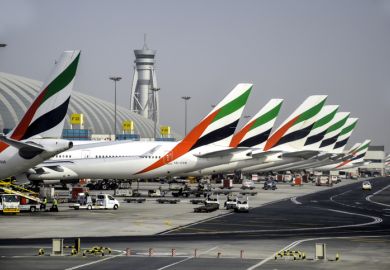University College London has been accused of failing its “moral duty” after a labour union claimed to have found evidence of forced labour and exploitation on an academic complex in Qatar that houses branches of several prestigious universities.
The International Trade Union Confederation said that on a visit to Education City in Doha, which houses the postgraduate centre UCL-Q, it had interviewed migrant workers who had paid a recruitment fee to obtain their jobs and been forced to sign a new, more poorly paid contract when they arrived in the country.
Both practices are forbidden in labour standards set out by the Qatar Foundation, which established the academic complex, now formally known as Hamad bin Khalifa University.
On a tour in February of the site, which houses six US institutions, plus one each from the UK and France, the confederation found staff who claimed to have suffered “trafficking for forced labour, including burdensome recruitment fees, fraud with regard to employment contacts and withholding of passports”, according to a letter from the ITUC outlining its findings. One cleaner from Sri Lanka said that his contractor had withheld his passport. He also said that he had paid a recruitment fee, his salary was less than had been promised and he lived in a room with 10 other men.
The workers were employed by subcontractors contracted by the Qatar Foundation, which manages the campus, the ITUC says in the letter to universities with branch campuses there.
The ITUC acknowledges that the investigation was “preliminary and admittedly limited” but adds that it is “highly likely” that other staff on the site have suffered similar labour violations.
In its initial response to the ITUC letter earlier this year, UCL said that it has “no direct influence on the employment arrangements of the Qatar Foundation” and it would be “inappropriate” to review the employment arrangements of those working for another organisation.
Jeff Vogt, a legal adviser at the ITUC, described this response as “very disappointing”. “If somebody is cleaning your floors, you still have an obligation”, regardless of whether they are a direct employee, he said.
Sally Hunt, University and College Union general secretary, said that universities had a “moral duty to ensure that people working on their foreign campuses have access to the same rights as they would be afforded in the UK”.
“Hiding behind subcontractors is morally indefensible and an act of cowardice,” she added.
In a statement to Times Higher Education, a spokesman for UCL said that Dame Nicola Brewer, its new vice-provost international, would be meeting with Qatar Foundation staff in the autumn and “the issues raised will form part of that dialogue”.
The other universities on site that were informed of the ITUC findings are Carnegie Mellon, Weill Cornell, Georgetown, HEC Paris, Northwestern, Texas A&M and Virginia Commonwealth. None of these institutions responded to enquiries by THE, although Mr Vogt said that Georgetown had made contact with the ITUC after receiving the letter.
A Qatar Foundation spokesman said that its statement of labour standards addressed many of the issues raised by the ITUC, and that it had carried out visits to workers’ home countries and site visits in Qatar to enforce them.
Register to continue
Why register?
- Registration is free and only takes a moment
- Once registered, you can read 3 articles a month
- Sign up for our newsletter
Subscribe
Or subscribe for unlimited access to:
- Unlimited access to news, views, insights & reviews
- Digital editions
- Digital access to THE’s university and college rankings analysis
Already registered or a current subscriber? Login





